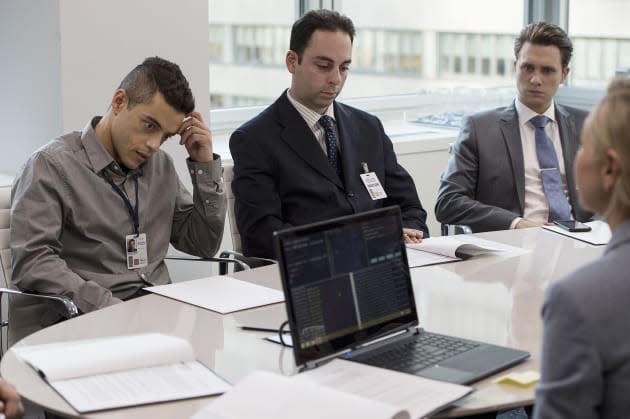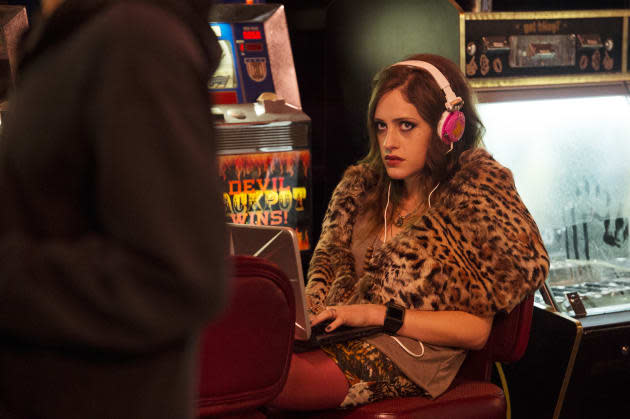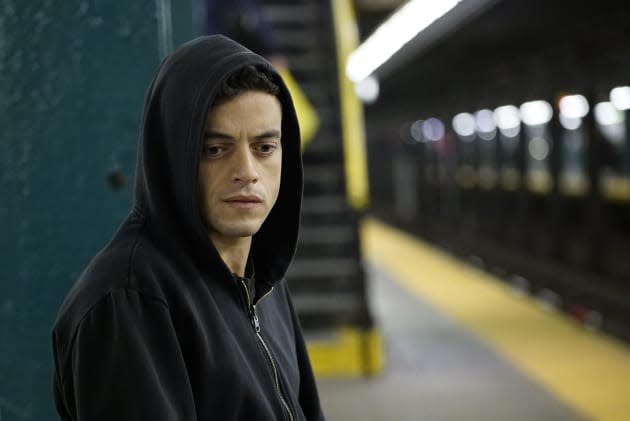'Mr. Robot' creator on the evils of Facebook and hackers in Hollywood

You'd be forgiven for being skeptical about Mr. Robot, USA's new hacker thriller starring Rami Malek and Christian Slater. In general, movies and TV shows haven't done a great job of portraying hackers, and really, technology of any sort. Even the king of cinematic cool, director Michael Mann, couldn't make cybersecurity exciting with the film Blackhat. But that's what makes Mr. Robot so special: It's a show about hackers that actually features live computer screens with working code and viable cyberattack vectors. It centers on a disaffected cybersecurity expert named Elliot (Malek), who stumbles on a clandestine group of hackers dedicated to disrupting the global economy. We sat down with the show's creator, Sam Esmail, for a long conversation about how it came to be.
What was your inspiration for Mr. Robot? I'm seeing plenty of elements from Fight Club and Taxi Driver in the show.
The hacker side of it actually was a combination of my frustration with the way hacker culture and tech culture was represented in Hollywood. I thought it was a very inaccurate, forced and cartoonish way of representing that kind of a culture. I never understand why they felt the need to use cheesy CGI graphics, and make magical leaps -- logic leaps -- in action when the actual reality is far more interesting and compelling.
The other side of that is my passion for wanting to do a story about this culture, just because I thought it deserved better. I personally found it compelling and fascinating. The reason why I even had this inclination is because I was a nerd growing up; my friends were nerds. ... And they actually kind of served to be my inspiration as well. I just found them interesting and fascinating ... and lacking in Hollywood, and that kind of all added up to the genesis of Mr. Robot.
Although, when you boil it down from there, I really wanted to do a character piece about one specific character from this world. I wanted to be inside his head as intimately and as close as possible. Then the character of Elliot started to form. Taxi Driver hands down is probably one of the best character pieces in cinema, so of course that was an inspiration. The use of VO (voice over) and the sort of isolation, in terms of the filming and storytelling -- really you're just locked in with this guy.

Did anything inspire the idea of using technology to change the world?
I'm Egyptian, and I have a lot of cousins out in Egypt. I went out right after the Arab Spring and my cousins were part of the whole movement. They were 20-year-old kids who used Facebook and Twitter to sort of start this movement and bring about this dramatic change, unlike any I've ever heard of in the history of Egypt. That moved me so much, and I found that so inspirational. Obviously that ties so well into that sort of ongoing monologue in my head about wanting to write a story about a hacker. When I talked to my cousins and heard their passion and anger, there's this kind of a fine line. What I thought was interesting was that anger was typically considered a negative emotion. But this was not negative; this was positive and channeled in a very positive way to bring about much-needed change over there. If it wasn't for that [emotion], it wouldn't have happened.
There was a huge amount of respect I had for my cousins, a huge amount of fear. ... The bottom line is that it was very gripping, and that became a huge component in writing Mr. Robot.
Do your cousins actually attribute technology to much of the Arab Spring? There's plenty of commentary online against that idea.
Absolutely. The thing about Egypt is there's a lot of control over the newspapers, over the television, so information cannot really be disseminated really easily there. So it's hard to organize in Egypt without that. ... There is no way to control the internet; the beauty of the internet is that it's incredibly decentralized. There isn't one on/off switch. And as much as Egypt has tried to control it, there are major loopholes and ways that young people can sort of circumvent the system. And it's beautiful ... that that wound up being the thing that shifted the power, because it's just something the older generation couldn't fully understand.
I remember talking to my aunts and uncles, who belonged to the older generation, and they still don't quite get that the internet is a compilation of computers. I don't think it's an educational thing. If I were to ask people here in the states if they could describe what the internet looked like, I think people still think it's a machine in some closet somewhere. So it's fascinating how that one piece sort of shifted this huge amount of power to the younger generation. And I actually think that's beautiful.
Around that idea of the internet being this open place for an exchange of ideas, there's a lot of controversy about Reddit these days. Is that something you've been following?
I need to give Reddit a shout out (on the show), because I actually think it's a great platform. In terms of social media, which I've actually gone on record of not being trustful, Reddit, I would say, feels very genuine in terms of being open. [Esmail also recently held a Reddit AMA session.]
So you're not a big Twitter user?
Twitter I actually mind less because I think it's meant for publication, for publishing. It's not necessarily about relationships; it's more of a platform to distribute entertainment via witty tweets, links or whatever. ... But Facebook is where I really have the problem. Because those are meant to be my private interactions with my family and close friends. And here we are giving it to a large corporation. ... They have all this information on us, and that's exactly how they make money, and they're going to monetize it. And there's just something incredibly dangerous about that.

Are you at all worried about Facebook trying to consume the web? That's kind of where they're going now by having media companies publish their content directly on Facebook.
There were these discoveries that Facebook has been conducting psychological tests and social experiments, and then using the information they know about you to manipulate how you feel about certain things. I mean, just think about the consequences of that. A corporation whose sole purpose is profit, knowing all these personal intimate details of your life, and then using this against you in some sort of subtle, subliminal psychological warfare to compel you to either buy products, or switch from one product to another. To me, that's just incredibly disgusting and Orwellian. I don't really know why there isn't more of an uproar.
USA did a survey when our show premiered, targeting millennials, and asked if they could go back in time and start over, would they join Facebook. And I think, overwhelmingly, most people said no, which is great. [The survey actually noted most Americans wouldn't join any social media site.] I still don't know why it's as popular as it is. I'm hoping either that changes, or Facebook changes. But I doubt Facebook will.

The hacking elements feel a lot more realistic than other shows and films. How did you achieve that?
I was probably a huge tyrant about it on set. I'm sure I didn't make many fans because of it, because it takes a lot of work. Everything from the writing of it, to the execution, to the production design, to the shooting, we don't shoot any green screen when we deal with a computer screen. That's all done practically. So that required a production design to build all the screens beforehand. And it required our tech consultants to walk us through what those screens would look like. And then it required the actors to follow all the commands and type all the commands that an actual hacker would need to do. All of that required a lot of time and energy and money. And then in post [production] if I saw something that wasn't right, we had to fix it and redo it by reshooting those screens.
I became incredibly obsessive about it because I just think in reality, this is what goes on. These screens are not fake. I never wanted to conjure anything up, or fake anything, because the reality of it is far way more interesting than anything I could imagine. There were times when people wanted to take shortcuts and I started to understand why I was frustrated all these years. People think that that's not the drama; it's not in the coding. Which they're right, but if you start fudging on that, you lose the credibility of the world. And if that starts to go, then the drama goes with it. I hope we proved it.
This interview has been condensed and edited.
[Images: NBCU Photo Bank via Getty Images]
